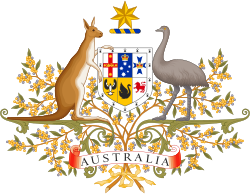Love v Commonwealth facts for kids
Quick facts for kids Love v Commonwealth; Thoms v Commonwealth |
|
|---|---|
 |
|
| Court | High Court of Australia |
| Argued | 8 May 2019; 5 December 2019 |
| Decided | 11 February 2020 |
| Case opinions | |
| (Love) (4:3) Aboriginal Australians (understood according to the 3-part test in Mabo v Queensland (No 2)) are not within the reach of the "aliens" power conferred by s 51(xix) of the Constitution). The Court is unable, however, to agree as to whether Mr Love is an Aboriginal Australian and unable to determine whether Mr Love is an "alien" under section 51(xix) of the Australian Constitution. (per Bell, Nettle, Gordon & Edelman JJ) (Thoms) (4:3) Aboriginal Australians (understood according to the 3-part test in Mabo v Queensland (No 2)) are not within the reach of the "aliens" power conferred by s 51(xix) of the Constitution. Mr Thoms is an Aboriginal Australian and is not an alien under section 51(xix) of the Australian Constitution. (per Bell, Nettle, Gordon & Edelman JJ) |
|
| Court membership | |
| Judges sitting | Kiefel CJ, Bell, Gageler, Keane, Nettle, Gordon, Edelman JJ |
The case of Love v Commonwealth; Thoms v Commonwealth was an important decision by the High Court of Australia, which is Australia's highest court. This case, decided on 11 February 2020, ruled that Aboriginal Australians cannot be considered 'aliens' (meaning foreigners or people from other countries) under a specific part of the Australian Constitution.
Contents
What the Case Was About
This court case was about two men, Daniel Love and Brendan Thoms. Both men had lived in Australia since they were small children and had close family here. They were also legal permanent residents of Australia.
However, they faced a problem with their visas. They had committed serious offenses, which meant they failed a "migration character test." The Australian government then tried to deport them, treating them as 'aliens' under a law called the Migration Act 1958.
Daniel Love's Story
Daniel Love was born in Papua New Guinea. He was a recognised member of the Kamilaroi people, an Aboriginal group. After he was sentenced for an offense, his permanent residency visa was cancelled. He was then held in immigration detention. Later, this decision was overturned, and he was released.
Brendan Thoms' Story
Brendan Thoms was born in New Zealand. He was a member of the Gunggari people and had a special legal connection to land through native title. After serving part of a sentence for an offense, he was also placed in immigration detention. He remained in detention until the court made its final decision.
Why the Case Was Important
The main question for the High Court was whether Aboriginal Australians could be considered 'aliens' by the government. The Attorney-General of Victoria, a legal representative for the state of Victoria, supported Love and Thoms. They argued that because Aboriginal people have a unique and long-standing connection to Australia's land and waters, they should not be seen as 'aliens'.
The Court's Decision
The High Court judges each wrote their own detailed reasons for the decision. However, a majority of the judges (Bell, Nettle, Gordon, and Edelman JJ) agreed on a key point: Aboriginal Australians cannot be treated as 'aliens' under the part of the Constitution that gives the government power over 'aliens'.
What This Meant for Love and Thoms
- For Brendan Thoms, the court decided he was an Aboriginal Australian. Because of this, they ruled he was not an 'alien' and could not be deported.
- For Daniel Love, the court could not immediately decide if he was an Aboriginal Australian. They sent his case back to a lower court, the Federal Court of Australia, to figure out that question.
What Happened Next
The day after the decision, the Attorney-General of Australia, Christian Porter, said that the ruling created a "new category of people." He called them "non-citizen non-aliens" or "belongers." This meant the government would need to find different ways to deal with Aboriginal non-citizens who had committed serious offenses.
Peter Dutton, who was the Minister for Home Affairs at the time, said the decision was "a very bad thing." He believed it would be used by lawyers and that he was looking for ways to "restrict the damage" caused by the ruling.
Legal experts like Professor Anne Twomey said it was too early to know all the effects of the decision. The Law Council of Australia also noted that the case raised many "complex issues" that would lead to much discussion.
Eddie Synot, an Aboriginal lawyer, explained that the judgment was about a very specific part of the 'aliens' power. He stressed that the decision was not about recognising Aboriginal sovereignty (the idea that Aboriginal people have their own independent power or authority over their lands).
See also
- Australian Aboriginal identity
- Australian constitutional law
 | Isaac Myers |
 | D. Hamilton Jackson |
 | A. Philip Randolph |

